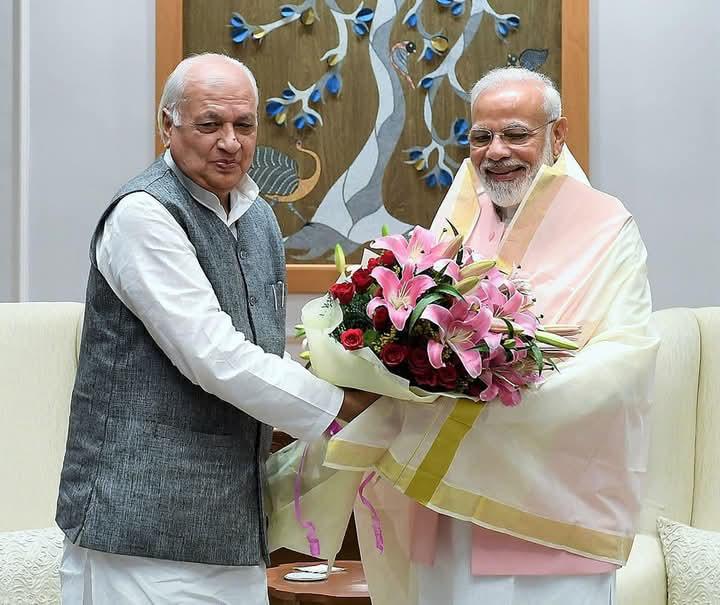Arif Mohammad Khan’s Appointment as Bihar Governor: BJP’s Strategic Muslim Face or Political Gamble Ahead of 2025 Elections?

M I Khan, TwoCircles.net
Patna: The surprise appointment of Arif Mohammad Khan as the governor of Bihar by the Bharatiya Janata Party (BJP)–led National Democratic Alliance (NDA) government in the Centre has raised eyebrows. Political observers suggest that the move may not yield the desired results, especially with the state’s assembly elections looming next year.
Following the announcement by President Droupadi Murmu, Khan replaced Rajendra Arlekar as Bihar’s governor. Arlekar was shifted transfer to Kerala as governor. Leaders from the ruling NDA (the Janata Dal-United, the BJP and the Hindustani Awam Morcha), particularly from the saffron party, have welcomed the appointment, while major allies like the JD-U have remained notably silent.
The move sparked a political storm as Opposition leaders from the Rashtriya Janata Dal (RJD) and the Congress raised questions about the timing and motivations behind the decision. “There is a clear political motive behind Khan’s appointment. The ruling NDA’s attempt will fail. The people of Bihar are aware of the conspiracy to spread hate, and we will not allow the governor to engage in politics,” said RJD spokesperson Ejaz Ahmad.
Congress leader Rajesh Rathod added, “The BJP appointed Khan as governor to sideline Chief Minister Nitish Kumar. One thing is certain: the BJP will use Khan, who is more loyal than Arlekar, to play politics with Nitish Kumar. We will see the full impact of this in the coming months.”
However, BJP leader Prabhakar Mishra defended the appointment and called it a fitting response to those who falsely label the BJP as anti-Muslim.
Hilal Ahmad, from the Centre for the Study of Developing Societies (CSDS) in New Delhi, pointed out that Khan represents the BJP’s vision of a “good Muslim”. This assessment appears accurate, as Khan has supported many of the BJP’s policies in recent years – including the ban on instant Triple Talaq, the Citizenship Amendment Act (CAA), the abrogation of Article 370 in Jammu and Kashmir and the push for a Uniform Civil Code (UCC). He even supported Uttar Pradesh Chief Minister Yogi Adityanath’s controversial statement – “Batoge to Katoge” (divided you will fall).
Khan, 73, who served as the Governor of Kerala until December 24, has long been known for his public tussles with the Left Front-led government in the South Indian state that began in 2019. His tenure was marred by controversial statements and actions, including opposing the Kerala government’s bills and making alleged inflammatory remarks while holding a constitutional position. For instance, in 2019, he called eminent Marxist historian Professor Irfan Habib a “goonda” (goon) and accused him of attempting to assault him at the Indian History Congress in Kunnur.
Observers suggest that Khan’s appointment as the Governor of Bihar is part of a strategic political move by the NDA in view of the upcoming state assembly elections. “Khan’s appointment is a politically motivated decision, aimed at gaining favor with certain voter bases in Bihar,” said one political analyst.
Khan’s tenure as the Governor of Kerala was filled with controversies. He was seen as a strong supporter of the BJP’s agenda, frequently making remarks that were seen as divisive. This has led some to speculate that the BJP will use Khan as a Muslim face to counter the narrative that it is anti-Muslim, especially ahead of the 2024 Bihar Assembly elections.
Another political analyst suggested that the BJP is positioning Khan as a progressive, nationalist Muslim to help shift public perception and strengthen ties with Muslim voters nationwide. “With the rise of Islamophobia, the BJP and the RSS (Rashtriya Swayamsevak Sangh) have been working to engage with the Muslim community, and Khan is seen as someone who can help change the narrative,” the analyst noted.
Khan’s political journey, however, is not without complexity. He first gained national attention in 1986, when he resigned from Rajiv Gandhi’s cabinet in protest of the government’s stance on the Shah Bano case. At that time, he emerged as a champion for secularism and progressive reform in the Muslim community. However, his later political moves have suggested a more opportunistic approach. After leaving the Congress, Khan joined the Janata Dal, where he became a union minister in the V.P. Singh government. In the years that followed, his political affiliations shifted. He finally joined the BJP in 2004, resigning in 2007 after claiming he was sidelined within the party.
Despite his controversial and shifting political loyalties, Khan’s association with the BJP has become more pronounced. His support for the party’s agenda has earned him key positions, including his appointment as the Governor of Kerala in 2019 and now, as the Governor of Bihar.
Khan’s rise to prominence began when he was a young leader in Uttar Pradesh, first aligning with the Bhartiya Kisan Dal (BKD) and later moving through various political factions, including the Congress, the Janata Dal and finally, the BJP. His political journey has been marked by shifts in allegiance that have often been interpreted as moves to align with the ruling establishment. While he has positioned himself as a reformer in the Muslim community, his tenure with the BJP has seen him become a vocal supporter of Hindutva politics.
As the political temperature rises in Bihar ahead of next year’s assembly elections, Khan’s appointment is likely to continue to spark debate. While some see him as a strategic move by the BJP, others view it as an attempt to shape the political landscape in Bihar by utilising Khan’s Muslim identity to counter Opposition narratives. However, whether this move will have the desired effect on Muslim voters remains to be seen, as many political analysts remain skeptical of its success.
